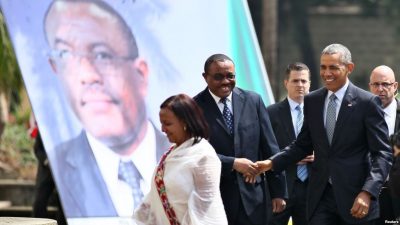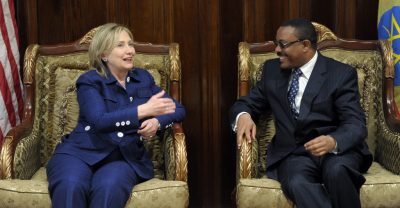Fanuel Lakew interviews Professor Ann Fitz-Gerald
Professor Fitz-Gerald is a scholar of Security Sector Management at the Centre for Defence Management & Leadership of Cranfield University in the UK. She serves as a Course Director for the MSc Security Sector Management programme both in the UK and here in Addis Ababa, Ethiopia. She also teaches issues in international conflict, security and development and strategic planning for security and development, among others. Her research focuses on peace-building, the development of national security strategies, and the reform of national security sectors. Fanuel Lakew spoke with Professor Ann Fitz-Gerald on Ethiopia’s growing presence and influence in regional and international diplomacy and politics.
Fanuel Lakew: How do you measure whether a country is influential or not?
Ann Fitz-Gerald: Although I would like to say that the influence of existing and emerging powers goes beyond economic wealth, this remains the key factor. However, countries that remain exemplary in areas such as the promotion of human rights, peace and stability, also command both attention and respect at the international table.
FL: How do you evaluate Ethiopia’s influence and credibility in international and regional politics? As many agree that Ethiopia’s presence in international discourse has been increasing. Do you agree with this?
AFG: I agree that Ethiopia’s presence and influence in both regional and international politics has increased. Its role as leading troop contributing nation to UN peacekeeping, its impressive and continuous annual rates of economic growth, and its projection of regional stability in a very volatile and unstable region are all drivers which have bolstered the country’s influence.
Ethiopia chairs IGAD and has been recently elected as UNSC non-permanent member. It is also a leading country in deploying peacekeepers in UN and AU missions and hosting considerable number of refugees. These are among the testimonies for its engagement in international and regional affairs. Thus, could these activities be taken as signs of growing influence or credence in international politics?
Most certainly – and this echoes my point above. In addition to these leading international roles, I think that Ethiopia’s gradual and sustained approach to economic growth has also grasped the attention of many other global actors. Ethiopia has a story to tell… a story which has led the country to becoming an ‘inclusive’ – rather than an ‘extractive’ economy… which sees Ethiopians living inside and outside the country investing in the nation’s future.
The story also extends to the way in which the country’s armed forces serve as a ‘force for good’ not only externally in African peace missions, but also internally and in a way which is becoming increasingly representative of society. Unlike many post-conflict and post-liberation struggles, Ethiopia has developed more ‘homegrown’ and less ‘conventional’ approaches to addressing its challenges. I still believe that there is still much to be learned from these ‘homegrown’ and incremental approaches to change and development.
I believe that Ethiopia has demonstrated an increased capacity and interest to work with civil society and professional groups. The Peoples’ Forum has developed as one such mechanism for dialogue – and for connecting with the people – and, whilst those groups participating on the citizens’ side of the table still wait to see the extent to which the government responds to their concerns, early signs suggest progress in the right direction.
The way in which Addis Ababa has been cleaned up, become an easily accessible capital city due to the ease of entry into the country and access to good transportation infrastructure, also provides a good base for tourists (and investors) to explore the rest of Ethiopia.
Ethiopia has also increased its global export trade, despite its requirement for foreign exchange. However, the country has expanded its export markets without prices for key commodities (such as teff and coffee) being raised to levels unaffordable for the Ethiopian people.
Finally, the way in which government institutions such as the Revenue and Customs Authority, and the Ministry of Mines, provide a more efficient ‘one stop shop’ to facilitate foreign investment and business, also represent significant achievements which have supported ongoing development. Although these efforts have led to increased activity of non-Ethiopian corporations, the government has also developed policies to try and promote local enterprise and local employment in direct proportion to this foreign investment.
FL: What are the main challenges for Ethiopia to further improving its sphere of influence in global affairs?
AFG: I think that the challenge for any country undergoing rapid economic development is threefold: continuing to develop as a nation amidst regional volatility; ensuring that the development remains ‘even’ and ‘comprehensive’; and ensuring that the policies and regulations that have been put into place to support Ethiopia’s ambitious development programme can be realized and enforced.
The peace and stability of Ethiopia depends on the peace and stability of the greater Horn of Africa region surrounding it. In this context, the Government of Ethiopia has worked hard to support peace and conflict resolution in South Sudan and Somalia, peaceful elections and national dialogue in Sudan, counter-radicalism and counter-terrorism in the region and ongoing discussions with riparian states partners on regional security issues relating to the Nile River. Donor governments will continue to look to Ethiopia for leadership in these areas in the future. These efforts require attention and resources, an expanding effort which is already difficult to sustain with existing demands on the country.
In terms of the second challenge, development prospects and the exploration of natural resources must serve to benefit the country writ large. As someone who comes from a federalist system of government such as Canada, I realize just some of the challenges associated with national wealth distribution which emanates beyond the wealth productive regions.
This also applies to education and the way in which knowledge and skillsets support economic development. Recent history has seen education systems across Ethiopia’s nine regions [states] experience different rates of development. So a challenge exists to ensure that wealth creation and employment opportunities benefit those who may not yet have the knowledge and skillsets to manage regional resources and development project opportunities. In this context, careful mentoring and capacity-building must remain key pillars supporting ‘even’ development.
Equally, in terms of the third challenge, with so much external investment coming into the country, clear policies and regulations guiding internal and foreign direct investment must not only exist on paper, but must have the ability to be enforced in an accountable way.
FL: What should Ethiopia do to strengthen its influential role at the international political arena?
AFG: Ethiopia is currently on the right trajectory to increasing its voice at the international table. I feel that the country should continue a momentum which can be sustained and which can, first and foremost, respond to the expectations of the people. With so many unique and ‘homegrown’ approaches to addressing both economic and institutional reform, research must be encouraged to ensure that these ‘homegrown’ experiences become documented over time, which enables others particularly in the region to learn from them. Lastly, the country should continue to increase its dialogue with the people in all sectors of society, as well as with other political groups.
Professor Ann Fitz-Gerald
Professor Ann Fitz-Gerald obtained a Commerce degree from Queen’s University, Canada; a Politics degree from Queen’s University, Canada; a Masters of Arts (War Studies) from the Royal Military College of Canada; and a PhD from Cranfield University.
Ann has worked in the financial sector, for the Canadian Government (both in the Pearson Peacekeeping Centre and NATO Headquarters, Brussels) and the North Atlantic Assembly in Brussels.Following the completion of her PhD, she worked for King’s College, London University before taking up a post in Cranfield University’s Department of Management and Security.
Ann Fitz-Gerald serves as Course Director for the MSc Security Sector Management programme both in the UK and in Addis Ababa, Ethiopia. She teaches ‘Issues in International Conflict, Security and Development’ and ‘Strategic Planning for Security and Development’. Based on Ann’s academic qualifications and professional experience, she brings both a political science and management science ‘lens’ to the study of contemporary security challenges. Ann’s research interests include issues in peacebuilding, the development of national security strategies, and the reform of national security sectors.
Fanuel Lakew
Fanuel Lakew was a reporter at the Ethiopian Herald Newspaper of the Ethiopian Press Agency. He did his bachelor degree from Addis Ababa University in Political Science and International Relations in 2012 and has served as Secretary General of the Ethiopian Political Science and International Relations since 2012. Now, he studies M.A in Politics and International Relations at Central University of Gujarat, India.






No Comments Yet!
You can be first to comment this post!